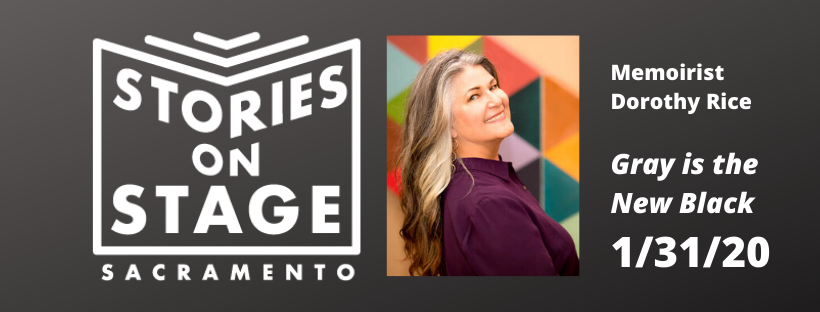|
By Sue Staats
Eyeing Dorothy Rice’s glorious mane of hair in a publicity photo (by Anita Scharf) for Gray is the New Black, a Memoir of Self-Acceptance, it’s hard for me to believe that it’s ever been anything but a source of pride for her. It’s thick, wavy, and gloriously multi-hued. But she writes that those curls have been a source of much anxiety, and that letting herself go gray was one of the hardest decisions facing her in her sixties, and, as readers find out as they journey with her for a year, the decision to color her hair is only one of the many self-image topics Dorothy faces, and writes about, with humor and insight. So many of the issues she uncovers resonated with me. Yes, yes, I kept saying to myself, as I turned page after page – shameful and never-confessed behavior as a teen, check. A mother who was never satisfied with her own weight and transferred that dissatisfaction to me, check. A cycle of resolution/failure/resolution, check. Even migraines, check. So when I made up a list of questions for Dorothy, I was most curious what had made other readers say, Yes, yes, that’s me. S. I can’t imagine anyone reading Gray is the New Black and not relating strongly to more than one of the many themes in the book. What are some of the most common responses you’ve had? D. Many readers have said that they felt they were reliving their own life stories, but there were two themes that sprang up most often in reader comments. One was the toxic relationship with food and the associated body dissatisfaction issues. The other was the difficulty of communication in marriage and other relationships - particularly the notion that our partners are often unable or unwilling to say the things we believe we need to hear. Readers have also appreciated the mix of humor and pain and the use of letting one’s hair go gray as a metaphor for the broader journey of self-acceptance and aging. One comment, or really a question, that I particularly loved was this, "Why don’t women ever feel like enough?! I also wonder if a woman with straight hair would ever have as much material for a memoir such as yours. Why is frizz such a confidence and self-worth killer?! I do believe the big-hair female experience is different from the not-big-hair one." The comment made me laugh. I felt as if the reader really "got" me. It also made me want to explore the topic more in a new essay. S. It’s true that “everything is copy,” to quote Nora Ephron, to whom you were compared in a complimentary review in Beauty Info Zone. And as a straight-haired woman, let me say yes, there’s plenty of material. But I’m struck with how many found the stories of your relationship with your husband so compelling. You’re remarkably open in describing your complicated feelings about how you two relate to each other, which was rightly praised as “raw honesty, an unflinching approach,” and you’re also very frank about sex, especially with your husband. How does he feel about that? Do your friends, his friends, who have read the book see him differently now? D: I shared the manuscript with my husband prior to seeking publication, as I did with all the "real" people who are "characters" in the memoir. We had some good, deep conversations at the time about my perceptions of our relationship, none of which he disputed, although he, I imagine, perceived events and conversations somewhat differently. After that initial read and a few talks, it hasn't seemed to bother him or occupy his thoughts, which is very consistent with how the two of us and our relationship are portrayed in GRAY. We speak very different emotional, and physical, languages. The book hasn't changed who we are. Overall, I feel that he is proud of me and for me. At book events and when the book comes up in conversation, he is my biggest fan. As for people looking at him, or me, differently, I haven't really noticed. Perhaps because he is so unabashedly in my corner since GRAY'S publication, such reactions are deflected. S. How about the rest of your family? Did it draw out anything from them that surprised you? D. I get asked this question a lot. I did share the manuscript with my sisters and four of our five children. I had expected my sisters to push back a bit on how they are portrayed as characters in the memoir, or, perhaps, for there to be some hurt feelings. That didn't happen. Both expressed that I captured my own idiosyncrasies and theirs. If anything, the book has brought us closer together, perhaps because it attaches words and scenes to the unspoken narrative we have long known existed between the three of us. For me, it has enabled me to release sibling resentment and jealousy and to more easily find the humor in my own reactions to my sisters. My biggest surprise, and greatest source of unhappiness, has been the reaction of one of my children. While the other children expressed pride and support after reading the book, one child found it too personal and revealing of our family. I made some changes in response to these concerns, but believe they would have preferred I shelve the book. I regret this divide, deeply. But I have also learned something about myself through living with this disappointment - that while I am a mother, I am also a writer, and given that my children are grown and my writing dreams were delayed for decades, publication of work that I'm proud of is important to me. S. The book chronicles your journey through one year, 2017. Have the years since, with the publication of the book and its success and acceptance, changed you? D. Yes. And no. I am the same grudging, family curmudgeon I have always been. But I have grown closer with my sisters, my husband and my children (with the one exception, sigh) and I work every day on remaining more tolerant of my weaknesses and proclivities. And, I am proud of GRAY, which has increased my confidence as a writer. S. Have you ever been called “brave” for writing this? If you are, what do you think of that? Do you feel “brave?” D. Yes, I have! I have mixed emotions about being called brave. I don't really see it that way. I see it more as honest, or transparent perhaps, about my own faults and missteps, as much as anyone else's. I believe many who call me "brave" are thinking about their own level of comfort with revealing themselves in their writing. I tend to think we reveal ourselves in our writing regardless, whether the work is couched as nonfiction or fiction. S. You’re paired with Pam Houston, with a selection from her new memoir Deep Creek. On the surface, the two memoirs seem very different but I suspect there are similarities lurking beneath the surface. Do you see any? D. That's a great question. I am thrilled and grateful to be on the same program with Pam, whom I admire and whose work I love. As you note, the memoirs are very different. Yet there are similarities. Both weave threads of past and present experience, both are deeply personal, honest and reflective stories where, at least as I see it, the narrators seek to find meaning and harmony in the present, in part by reflecting on where they have been before and what life has shown them. S. The segment being read by Gay Cooper Friday, January 31 details the beginning of the year in which this memoir takes place. Why did you choose this section? D. I like that this segment has some funny bits - I always appreciate a bit of levity at a reading. Also, the passages include good context and setting for the year-long journey covered by the memoir, as well as introducing most of the characters and themes. I'm hoping the audience will agree! S. As a writer, you’ve made lots of appearances where you read from your own work. How do you feel about hearing it read by an actor? D. I'm very interested to hear my work read, particularly by Gay. I always read my own work out loud when I'm editing, generally several times over, listening for words, phrases and transitions, anything that sound clunky, off or unnecessary. I'm curious what I will "hear" when it's someone else reading and if I will be able to relax and enjoy the performance, rather than critiquing my own work! S. In many memoirs there’s a sort of triumphant ending, where the writer has overcome some sort of travail – drug addiction, fear, whatever – but your book doesn’t do that. In the end the victory is a small one – the beginning of accepting what you cannot change, as they say in AA. Was this what you intended? D. This was intentional. I love that some have called GRAY a belated "coming of age" story. It is. I learned more about myself over the course of the year. As a result, I determined to be kinder to myself and others. It is my hope that I will continue to "come of age." S. Something we can all hope for! Thanks so much for your time, and for your honest, clever, smart and true writing, for your willingness to take risks, and for bringing it all to Stories on Stage Sacramento! Please join us to hear a reading from the memoirs of Pam Houston and Dorothy Rice this Friday, January 31, 2020. Please register to attend. To register more than one person requires you go through the process for each person. This glitch will be fixed for our next performance.
1 Comment
|
|
Who We AreLiterature. Live!
Stories on Stage Sacramento is an award-winning, nonprofit literary performance series featuring stories by local, national and international authors performed aloud by professional actors. Designated as Best of the City 2019 by Sactown Magazine and Best Virtual Music or Entertainment Experience of 2021 by Sacramento Magazine. |
|


 RSS Feed
RSS Feed
